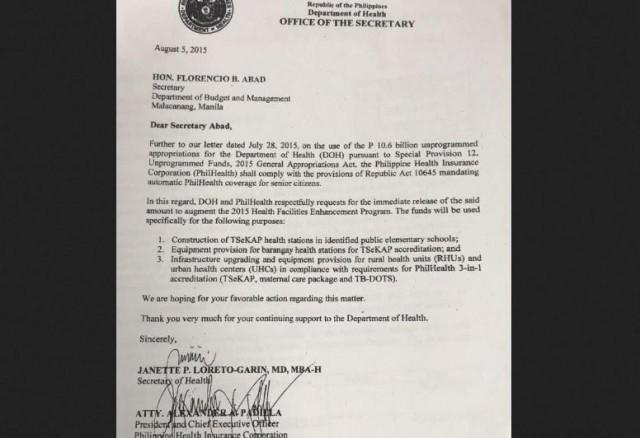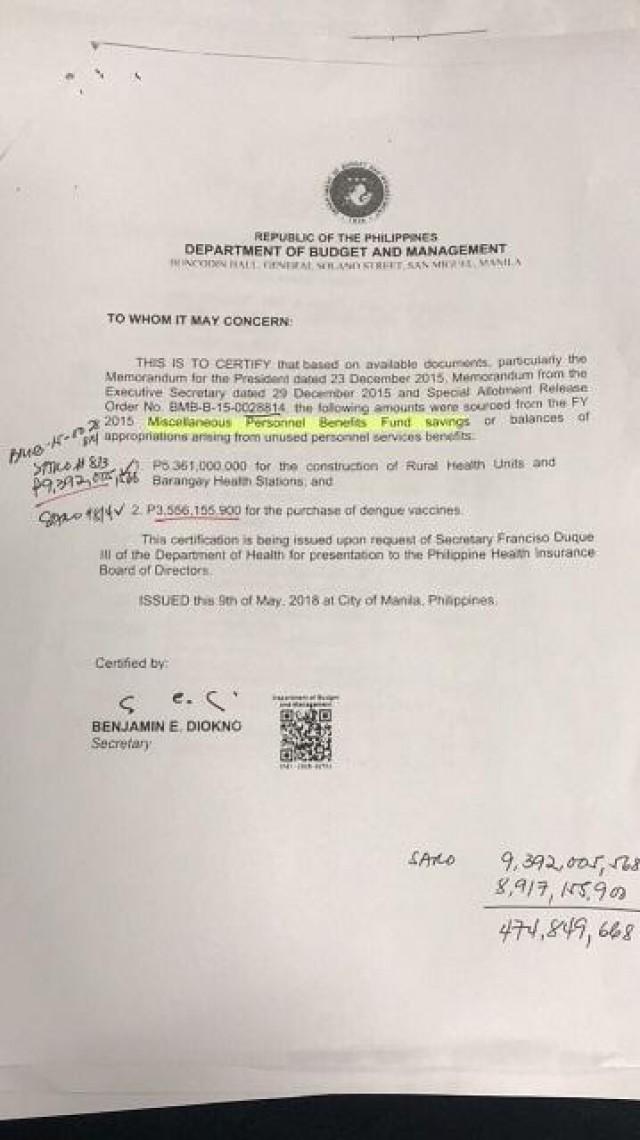Letter shows diversion of P10.6-B seniors’ fund, says Duque; ‘unprogrammed’ cash, counters Garin
A letter signed by then Health Secretary Janette Garin and then Philippine Health Insurance Corporation president Alexander Padilla showed that the two officials in 2015 requested P10.6 billion initially intended for senior citizens be used instead for the construction of rural health units in 2015.
Health Secretary Francisco Duque III on Wednesday said the letter signed by his predecessor and the Philhealth executive is "evidence by itself" that the P10.6 billion funds for the expanded Senior Citizens Act was diverted from its original use.
"That is evidence by itself. 'Di ko alam kung bakit sinasabi nila na ginagamit ito para pagtakpan ang mga financial irregularities as alleged by the former secretary," Duque said at a press conference in Quezon City.
"Pero kasi ito, may sulat, eh. We just abide by what the letter says. The thing speaks for itself," he added.


Garin denied on Wednesday that the P10.6 billion was earmarked for senior citizens alone. She insisted that it was categorized as unprogrammed funds for health expenditure, which the DOH and Philhealth may access.
Only DBM can answer 'missing link'
Padilla meanwhile said the letter was not proof of a diversion and that the Department of Budget and Management (DBM) still had the final say on the transfer of funds.
"Ang DBM ang makakasagot niyan, nung panahon ni Secretary (Florencio) Abad. Sa akin lang, ang masasabi ko, yung P10.6 billion in the hearing yesterday sa Senate, may missing link," Duque said.
"Yung missing link, yun bang paglipat noon sa General Fund ba, and then from the general fund ba, nalipat sa miscellaneous personnel benefit fund?" he added.
Garin and Padilla signed the letter dated August 5, 2015 that requested the release of the P10.6 billion unprogrammed funds from the 2015 General Appropriations Act for the 2015 Health Facilities Enhancement Program.
The 2015 Health Facilities Enhancement Program included the construction of Tamang Serbisyo sa Kalusugan ng Pamilya (TSeKAP) health stations in public elementary schools, and equipment for barangay health stations for TSeKAP accreditation.
Funds would have also been set aside for infrastructure and equipment upgrading for rural health units and urban health centers "in compliance with requirements for PhilHealth 3-in-1 accreditation.
However, the DBM certified on May 9, 2018 that funds for the construction of RHUs and barangay health stations, as well as the purchase of dengue vaccines, were sourced from the 2015 Miscellaneous Personnel Benefits Fund savings.
"Ang problema lang dito kasi is bakit sumulat ng hindi nagpaalam sa PhilHealth board?" Duque spelled out. "At bakit walang actuarial certification to show that the P10.6 billion may be waived?"
"But I'm sure kung nagkaroon ng actuarial certification 'yan, sasabihin, it must not be waived, kasi kailangan niyan for the long-term sustainability of the (PhilHealth) system."
Retrieving the P10.6 billion
Duque said DOH and PhilHealth are making moves to get back the P10.6 billion fund.
"We'll await for what the DBM will say," he said. "I think we will include this in the 2019 budget. We need to recover it... because, again, this will influence the long-term sustainability of the system."
Nerissa Santiago, PhilHealth OIC-Senior Vice President, Actuarial Services and Risk Management Sector, said PhilHealth's funds remain stable and will last for a decade longer than the 2021 projection presented before Senate on Tuesday.
"Because of the increase in contributions starting 2018, stable naman po ang ating program," Santiago said, noting that the prediction that PhilHealth funds will dry up in 2021 was based on 2016 figures.
Gregorio Rulloda, PhilHealth OIC-Senior Vice President Acting Chief Finance Executive, said the firm continued to pay benefits for senior citizens despite the loss of cash. —NB/KG, GMA News



